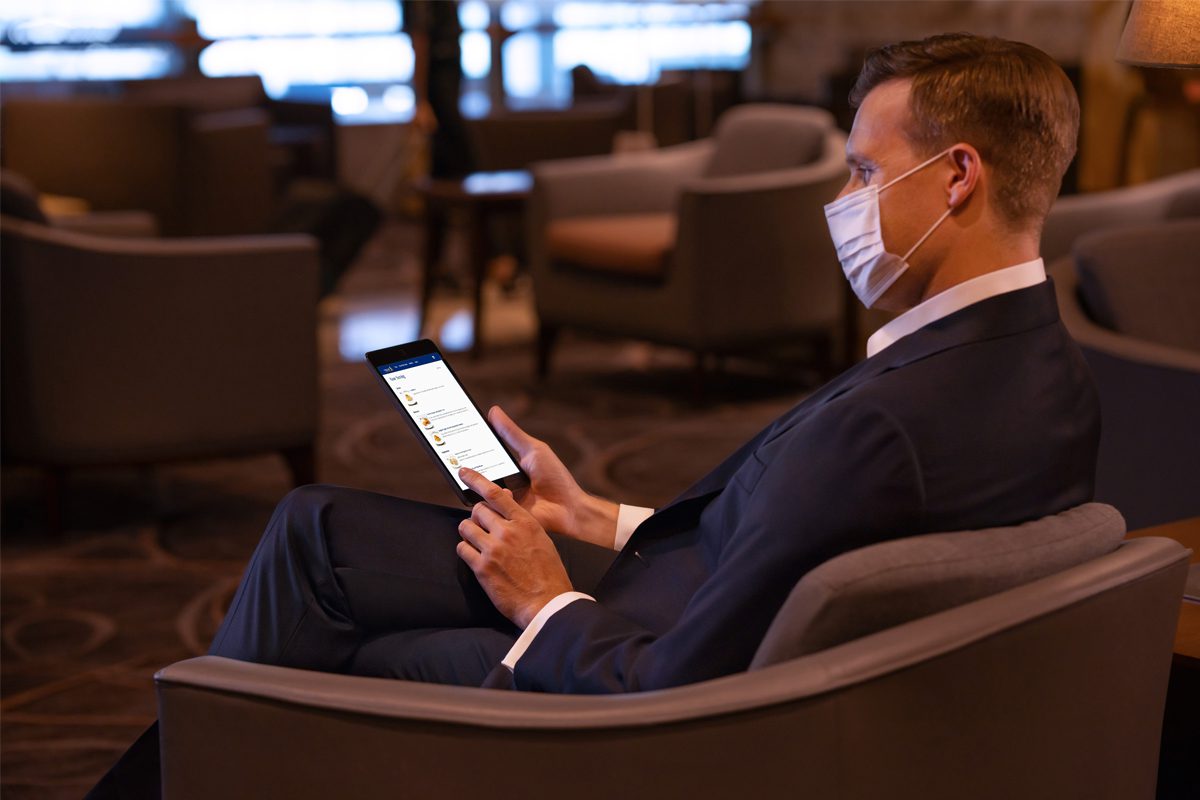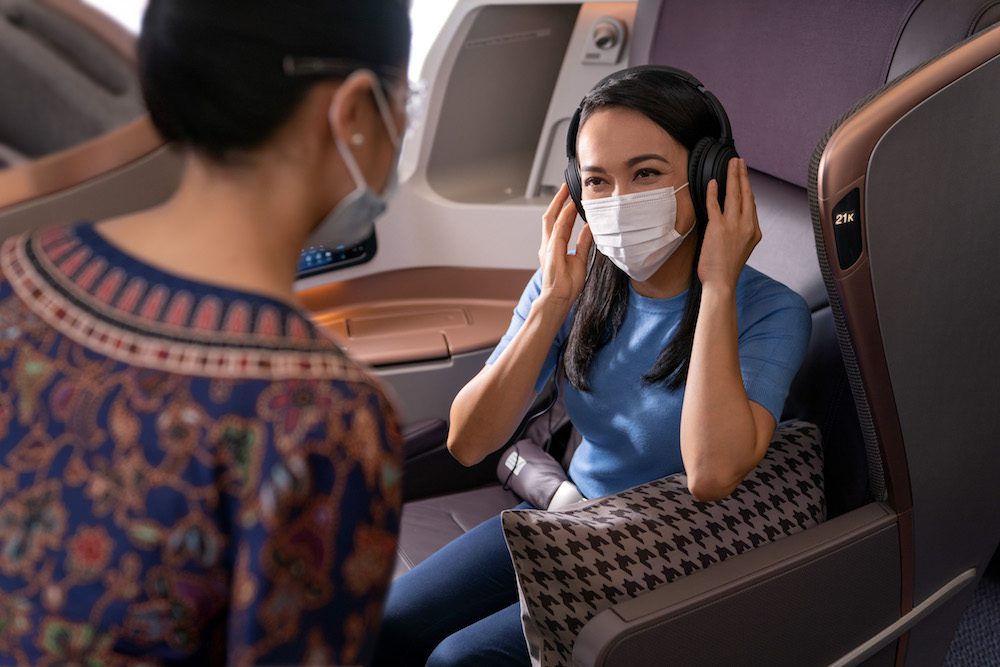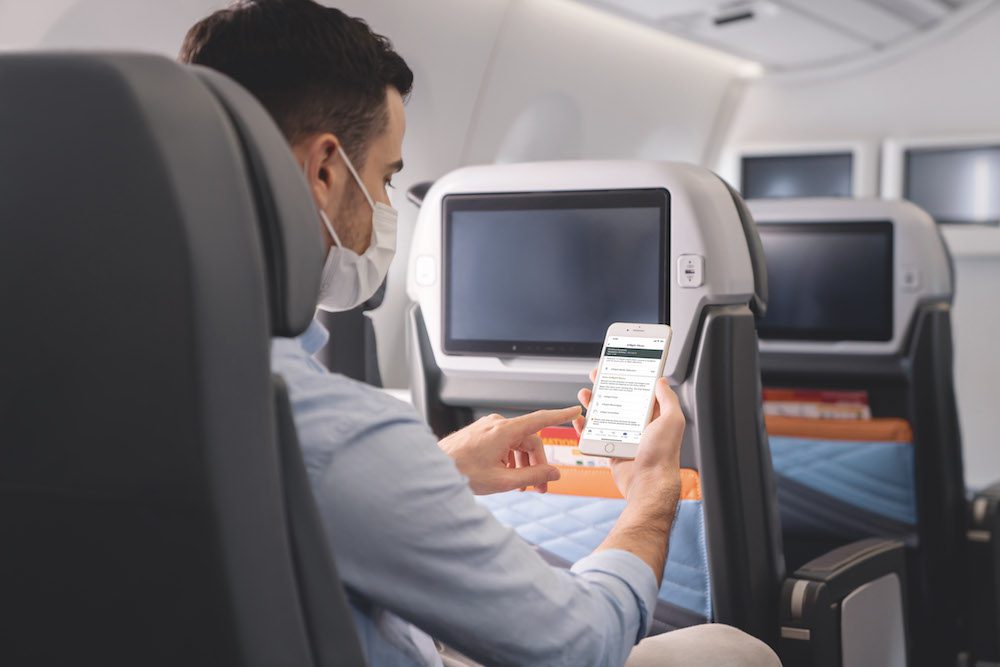Skift Take
Technology has proven to be a valuable friend to airlines in the Covid-19 era. As they reimagine every aspect of the travel experience to make trips as safe as possible for passengers and employees, digital solutions, for everything from booking to in-flight entertainment, have become vital.
This sponsored content was created in collaboration with a Skift partner.
Singapore Airlines has been an early adopter of technology and has long embraced its potential to enhance its customers’ journeys. In 2018, the airline launched a digital innovation blueprint, boosting its digital capabilities with the promise of enhancing the very core of the Singapore Airlines experience: its service culture. The following year, Singapore Airlines opened KrisLab, its digital innovation lab, which serves as a collaborative workspace for staff to think outside the box and develop innovative ideas using technology to enhance its offerings.
“Even before the Covid-19 pandemic hit globally, digital transformation in the customer journey has been a big part of what we do,” said George Wang, the airline’s senior vice president of information technology.
As the severity of the pandemic became apparent, the airline set up an internal task force and proactively took a comprehensive look at the customer journey. The task force identified around 100 customer touchpoints, evaluating each touchpoint to see how best to protect the health and safety of its customers and employees. It reinforced existing features, enhanced some, and introduced new ones — using digital technology to complement many elements.
For example, in December 2020, Singapore Airlines was the first airline in the world to trial a digital health verification process based on the International Air Transport Association (IATA) Travel Pass framework. It allows customers to store and present information related to Covid-19 tests to speed up airline check-in and immigration entry processes, while giving travelers control over how their personal health data is shared. Soon, it will also allow travelers to keep proof of vaccinations on hand to present as needed. IATA’s Travel Pass mobile application was successfully trialled on the first international flight operated by Singapore Airlines to London in mid-March 2021. This reflects Singapore Airlines’ goal of using secure digital solutions to verify health credentials and support a safe and seamless travel experience for customers.
“Robust health and safety measures are an important part of our premium position and brand promise. We want to ensure that both our staff and customers feel confident when they work or travel with us,” Wang said.
To understand the breadth of Singapore Airlines’ technology-driven solutions for safer travel amid the pandemic, it’s helpful to look at the digital tools along the customer journey.
NEW CONSIDERATIONS FOR BOOKING
Evolving travel restrictions and requirements have complicated bookings and pre-flight planning. Passengers need a lot more information on hand to make purchasing decisions, and they must be vigilant about monitoring travel advisories in case anything changes before and during their travel.
To address that challenge, Singapore Airlines has developed a way for customers to receive notifications on when their preferred destination has opened up for travel. In addition, customers with a firm booking can subscribe to digital travel advisory updates using the “Manage Booking” function, providing them with up-to-date information on any changes in travel regulations, pre-departure testing requirements, and more.
As their travel date approaches, customers can also view their in-flight meal options, access an electronic library of newspapers and magazines and download their preferred articles on their personal mobile devices for the flight, and order duty-free items through KrisShop.com to be delivered to them on board or to their preferred home address.
These features enhance existing digital tools including the ability to check in online via the Singapore Airlines website and mobile app, where a digital or mobile boarding pass can be generated to help travelers clear check in and boarding seamlessly. In addition, customers can make use of the airline’s chatbot, Kris, which can handle over 500 commonly asked questions. Over the last year, the chatbot has gained popularity as it offers round-the-clock assistance to questions on topics such as baggage allowances and in-flight meals.
Pre-departure testing has become mandatory in more countries. To help passengers navigate through the process, the airline has also piloted a way for travelers to schedule Covid-19 tests seamlessly after booking a flight, and get results through a single online portal. The service is available for travelers departing from Singapore, Hong Kong, Jakarta, London, and Medan, and the airline plans to expand it in the months ahead.
“Covid-19 tests and vaccinations will be an integral part of air travel for the foreseeable future,” Wang said, adding that the airline is working with IATA “to support and pilot an open and globally interoperable travel industry framework based on latest technology standards.” Cooperation will be essential to minimizing the hurdles presented by travel amid this challenging time.
MINIMIZED CONTACT AT THE AIRPORT
Putting travelers at ease in airports, which have always been high-traffic areas that require frequent interactions with people and touch screens, presented another challenge that has prompted several innovations at Singapore Airlines’ home base.
Singapore Changi Airport has rolled out contactless kiosks that respond to passengers’ selections when they point a finger close to the screen without actually touching it. To complement this, Singapore Airlines has made it easier for travelers to print baggage tags. To do so, travelers will simply need to scan the QR code in their mobile boarding pass, and their details will be auto-populated into the machine. Additional QR codes make it easy for passengers to update contact information without having close interactions with others during check-in. Keeping that information up-to-date is important, as it ensures the airline can reach them in case any flights or travel regulations change.
Singapore Airlines also changed procedures in its SilverKris Lounge at Singapore Changi Airport, suspending the self-service buffet meal service to keep customers and staff safe. Instead, travelers can place orders digitally for food and pick it up when it is ready, ensuring that safe distancing is observed during their time at the lounge.
If travelers have time to spare before their flight, they can use the airline’s SingaporeAir mobile app to peruse the in-flight audio and video entertainment and make a list of favorites to watch once on board. They are also encouraged to download their preferred reading materials from the airline’s e-Library prior to their flight.
MOBILE DRIVES EXPERIENCES IN-FLIGHT, AND AFTER
Once on the plane, travelers’ mobile devices become valuable tools. Travelers connect their personal mobile device to KrisWorld, the in-flight entertainment system of Singapore Airlines, using the in-flight Wi-Fi network. With this, passengers can use their personal mobile devices as a remote control for their seatback monitors, minimizing contact with high-touch surfaces. They can also access a digital menu on board the aircraft.
Once travelers are on the ground, they can continue to interact with the airline through the Kris+ app, which is a hub for its mileage and loyalty program. It centralizes the airline’s payment, lifestyle, and rewards services so that customers can easily access their loyalty wallet as well as discounts for dining, retail, and entertainment. They can earn miles and redeem them through the app, which also includes location-based and interest-based recommendations to serve as a personalized concierge that they can keep in their pocket.
MORE TO COME
Looking ahead, the airline is expecting to enhance and integrate its digital health verification process so that it is readily available through its mobile app. The goal is to reduce friction and anxiety for customers during this stressful time,” Wang said.
“Many of the innovations that Singapore Airlines has rolled out and enhanced over the past year will have a lasting impact on the travel experience even after the pandemic,” he added. Although some of them were necessitated by the global crisis, they fall in line with the company’s ongoing focus on innovation.
“Ultimately, we want to harness digital technologies to drive the Singapore Airlines service offering,” he said, adding, “We want to offer the best experience for our customers.”
This content was created collaboratively by Singapore Airlines and Skift’s branded content studio, Skift
Have a confidential tip for Skift? Get in touch
Tags: airlines, booking technology, bookings, covid-19, customer experience, customer service, digital health passports, singapore airlines, SkiftX Showcase: Aviation, travel recovery



